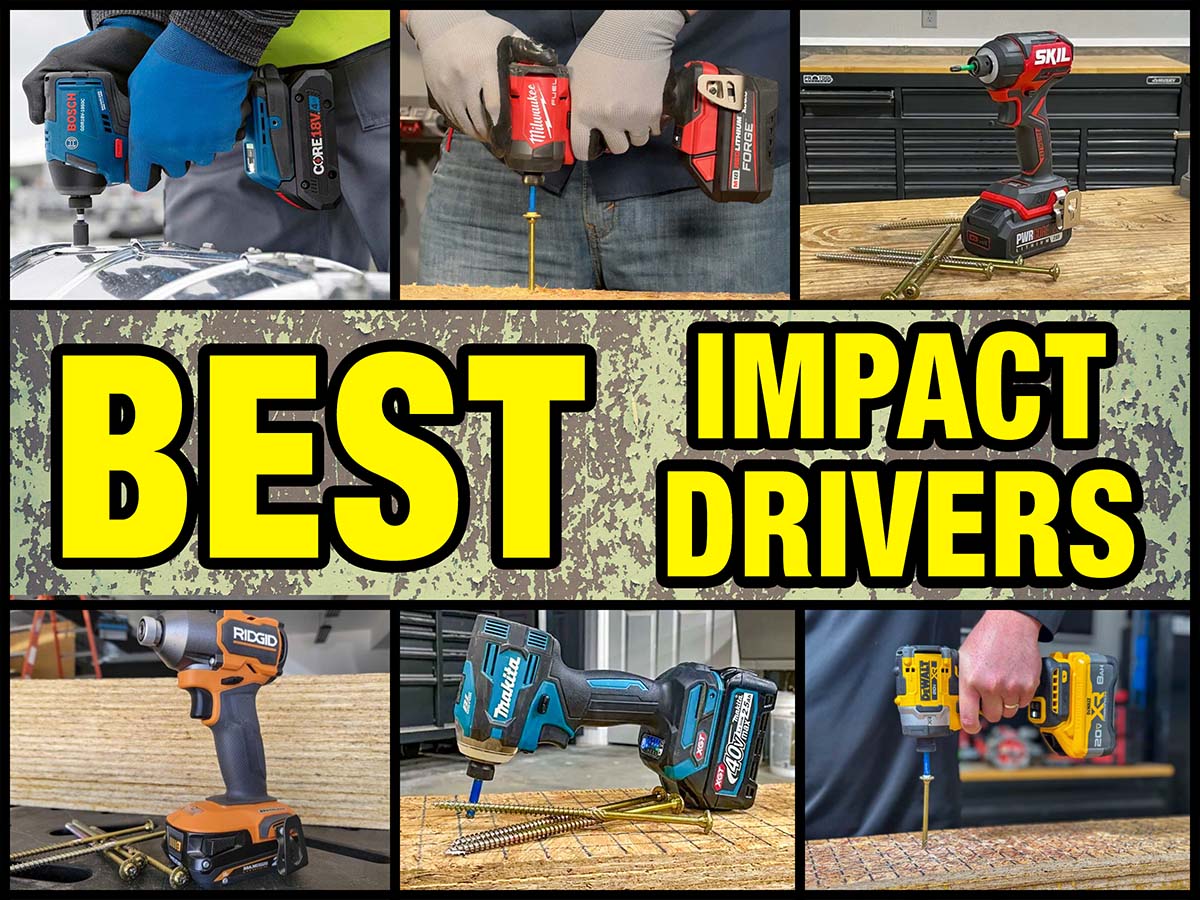Our 2025 head-to-head testing to find the best cordless impact driver included 12 models from brands that target DIY needs all the way through those that meet the needs of high-end Pros. In the end, there were some surprises that shook up the normal order you might expect.
In this review, I’ll walk you through how we tested, the full results, and which models rose to the top. I’ll also share what we look for when we’re evaluating these tools to help you make a more informed decision.
Best Impact Driver Top Picks
- Best Overall: Flex 24V Quick Eject FX1371
↓ Jump to this Impact Driver - Runner Up: Milwaukee M18 Fuel 2953
↓ Jump to this Impact Driver - Third Place: Ridgid 18V Brushless R862312
↓ Jump to this Impact Driver - Best for the Money: Ryobi 18V One+ HP Brushless PBLID04
↓ Jump to this Impact Driver
Scoring
Note that the scoring is different from our normal rating system. The scores are based on how each impact driver performed and compared in this specific group and this set of tests only. Our typical rating system offers a comparison of the tool to the entire range of what is available. Here’s how to interpret the scores from this test:
- 90 – 100: Outstanding. You’ll love using this impact driver.
- 80 – 89: Excellent. There may be minor tradeoffs.
- 70 – 79: Very good. There are more significant tradeoffs.
- 60 – 69: Good. Notable tradeoffs, but still earns our recommendation.
- < 60: Not recommended in the Pro impact driver class.
Jump to These Sections for More Information
- Other Models We Tested
- More Impact Driver Reviews
- Impact Driver Bit Recommendation
- Test Group Comparison
- How We Tested and Full Results
- What to Look for When Buying an Impact Driver
- Why You Can Trust Pro Tool Reviews
Best Cordless Impact Driver
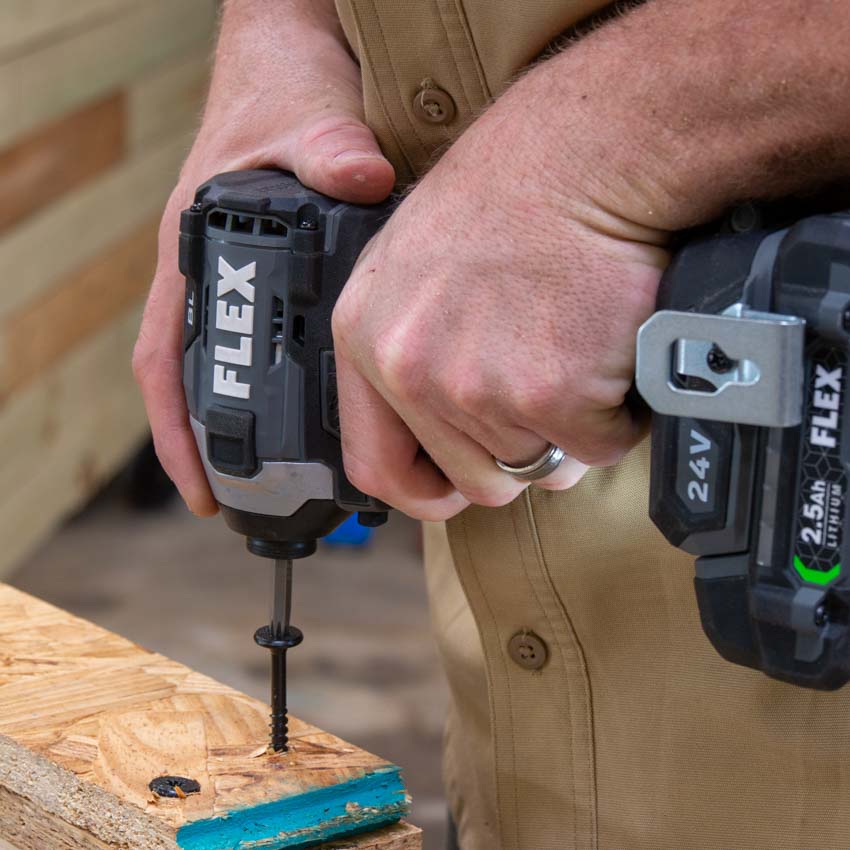
Flex 24V Quick Eject FX1371A
Score: 96 Points
- Top Speed: 4000 RPM
- Max Torque: 2500 in-lbs
- Impact Rate: 4450 IPM
- Length: 4.8 in
- Bare Weight: 2.7 lbs
- Tested Weight: 5.0 lbs
- Price: $159 bare, $179 – $279 kit
- 2-Tool Combo Price: $349
Highlighted Features
- Quick Eject: Release the collet with a button just above the trigger for quick bit changes
- Two Self-tapping Screw Modes: Reduces the risk of shearing off screw heads
- Lifetime Warranty: With registration after purchase (for tools sold by December 31, 2025)
Head-to-Head Testing Results
| Test | Result |
|---|---|
| RSS Screw | 5.86 sec (1st place) |
| Lag Screw | 0.63 in (1st place) |
| Bolt Break | 1.75 sec (2nd place) |
Pros
- Best overall performance
- Compact head length
- Unique collet release system
- Kit available with an advanced battery
- Lifetime warranty with registration
Cons
- Heavier than most competitors
Flex has held the best performance award since it first launched several years ago. In 2025, DeWalt became a serious challenger with its DCF860 high-torque model, but Flex still had the advantage in our head-to-head tests. That’s a real testament to just how far ahead of the competition Flex was (and is) with its first-generation impact driver.
Solid with a standard battery, it notches even higher performance with a Stacked Lithium battery. In our tests, it took first in two tests and finished in a close second in the third.
While it doesn’t feature one-hand bit insertion or active spring ejection, it does have a Quick Eject feature. You simply push the button just above the trigger to open the collet without having to take your hand off the handle. It’s a convenient way to switch bits quickly.
The trade-off is that this model is a bit larger and heavier than other top performers. However, it’s also priced a bit lower than most premium Pro brands and offers a lifetime warranty when you register the tool.
Best Cordless Impact Driver Runner Up
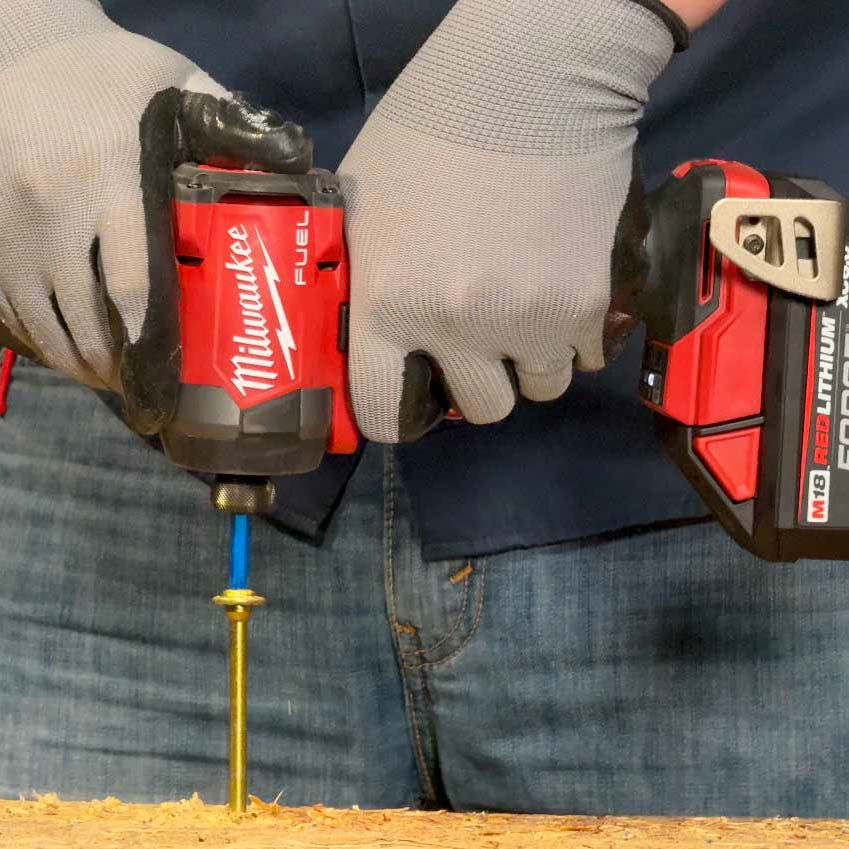
Milwaukee M18 Fuel 2953
Score: 94 Points
- Top Speed: 3900 RPM
- Max Torque: 2000 in-lbs
- Impact Rate: 4400 IPM
- Length: 4.5 in
- Bare Weight: 2.2 lbs
- Tested Weight: 4.6 lbs
- Price: $149 bare, $299 kit
- 2-Tool Combo Price: $399
Highlighted Features
- Self-tapping Screw Mode: Reduces the risk of shearing off screw heads
- One-hand Bit Insertion: Insert a bit without having to pull out the collet
- Tri-beam LEDs: Surround the collet and greatly reduce shadows
| Test | Result |
|---|---|
| RSS Screw | 5.96 sec (2nd place) |
| Lag Screw | 1.06 in (2nd place) |
| Bolt Break | 1.64 sec (1st place) |
Pros
- Second-highest overall performance
- Most compact head length
- M18 platform includes an expansive range of compatible tools
Cons
- Premium price
If you’re looking for the best combination of performance, size, and weight, look no further than Milwaukee’s M18 Fuel impact driver in its fourth generation. Second only to Flex in our performance tests, it’s significantly smaller and lighter. Pros also can’t ignore that Milwaukee has one of the most extensive selection of trade-focused tools on M18 battery system.
Part of Milwaukee’s success is that they bumped up the speed compared to the previous model. It increases 300 RPM to drive at a maximum speed of 3900 RPM. That also comes with a slight increase in impact rate to 4400 IPM.
Milwaukee also made some adjustments to the trigger. It’s now capable of smoother acceleration to give you more control over your screw starts. The design offers better control, especially at the start, and helps narrow the gap to models with more assist modes.
Unsurprisingly, the 2953 does come with the premium price tag we expect from high-performance, Pro-grade tools. You can ease some of the pain by grabbing the Gen 4 M18 Fuel 2-tool combo that includes the impact driver, the latest hammer drill, and a couple of batteries for $399.
Third Place Cordless Impact Driver

Ridgid 18V Brushless R862312
Score: 88 Points
- Top Speed: 3400 RPM
- Max Torque: 2400 in-lbs
- Impact Rate: 4200 IPM
- Length: 5.0 in
- Bare Weight: 2.3 lbs
- Tested Weight: 4.5 lbs
- Price: $149 bare, $199 kit
- 2-Tool Combo Price: $329
Highlighted Features
- Self-tapping Screw Mode: Reduces the risk of shearing off screw heads
- One-hand Bit Insertion: Insert a bit without having to pull out the collet
- Lifetime Service Agreement: With registration after purchase
| Test | Result |
|---|---|
| RSS Screw | 6.83 sec (4th place) |
| Lag Screw | 1.50 in (4th place) |
| Bolt Break | 1.93 sec (3rd place) |
Pros
- Excellent performance
- Excellent value
- Lifetime service agreement with registration
Cons
- No significant drawbacks
With the release of the R862312 impact driver, Ridgid made significant performance gains while making similarly drastic improvements to its size and weight compared to previous versions. This model’s torque is near the top of the charts and the speed is very much in the mix with premium brands. That showed in our latest round of testing where it put some distance on much more expensive names like DeWalt and Makita.
When it comes to features, this is a relatively straightforward model without a lot of bells and whistles (which many Ridgid fans appreciate), though it does have a self-tapping screw mode.
As we expect from Ridgid, the price is very reasonable, and the sub-$200 kit even includes an advanced Max Output battery rather than a standard pack. If you want the best value, grab the combo that includes the impact driver, Ridgid’s newest high-performance brushless hammer drill, and two Max Output EXP batteries packed in a hard case for $329.
Best Cordless Impact Driver for the Money

Ryobi 18V One+ HP Brushless PBLID04
Score: 87 Points
- Top Speed: 3400 RPM
- Max Torque: 2300 in-lbs
- Impact Rate: 4200 IPM
- Length: 5.2 in
- Bare Weight: 2.3 lbs
- Tested Weight: 3.8 lbs
- Price: $129 bare
- 2-Tool Combo Price: Not available
Highlighted Features
- Self-tapping Screw Mode: Reduces the risk of shearing off screw heads
- One-hand Bit Insertion: Insert a bit without having to pull out the collet
| Test | Result |
|---|---|
| RSS Screw | 6.80 sec (3rd place) |
| Lag Screw | 1.13 in (3rd place) |
| Bolt Break | 2.03 sec (5th place) |
Pros
- Excellent performance
- Lightweight
- 18V One+ platform includes an expansive range of compatible tools
Cons
- No kit or combo options
With the launch of the second-generation HP Brushless impact driver, Ryobi’s continued increase in performance and reduction in size is challenging some Pro brands and daring other DIY competitors to raise their game.
While still a little larger and heavier than we expect from premium models, the performance level is solidly in the Pro class. With the new High Performance Edge battery, it beat out some big names in our latest round of testing.
Teasing value-minded Pros even more, there’s a self-tapping screw mode to go with its three standard driving modes.
While it is possible to get a cheaper impact driver that will do the job well, Ryobi’s performance in our tests is significantly higher. If it’s the best balance of price and performance you’re after, Ryobi is where it’s at.
For now, the PBLID04 is only being offered as a bare tool. I’d love to see a kit, or more importantly, a 2-tool combo that pairs it with the Gen-2 hammer drill and a couple of High Performance batteries to push even more value into this impressive upgrade.
Other Impact Drivers We Tested
DeWalt 20V Max High-Torque DCF860
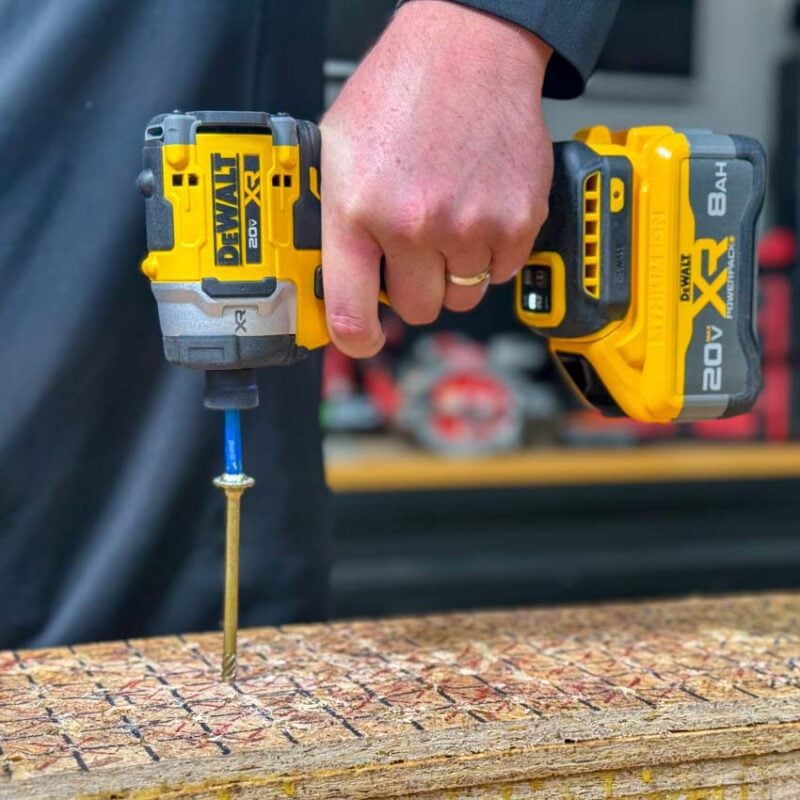
Score: 81 Points
- Top Speed: 3800 RPM
- Max Torque: 2500 in-lbs
- Impact Rate: 4500 IPM
- Length: 4.8 in
- Bare Weight: 2.5 lbs
- Tested Weight: 4.6 lbs
- Price: $219 bare, $269 – $319 kit
- 2-Tool Combo Price: Not available
Highlighted Features
- One-hand Bit Insertion: Insert a bit without having to pull out the collet
- Tri-beam LEDs: Nine LEDs surround the collet and greatly reduce shadows
- LED Light Controls: Adjust the intensity and duration of the lights
- Tool Connect Ready: Add the Tool Connect Chip for management applications
| Test | Result |
|---|---|
| RSS Screw | 7.54 sec (5th place) |
| Lag Screw | 2.50 in (5th place) |
| Bolt Break | 2.56 sec (6th place) |
Pros
- Noticeably higher performance than previous models
- Compact head length
- Kit available with an advanced battery
- 20V Max platform includes an expansive range of compatible tools
Cons
- Premium price
- No combo kit option
After setting a new standard for compact size with its DCF850, DeWalt set its sights on raising its performance game. With the launch of the DCF860, DeWalt made massive gains in that department. Sporting significantly higher torque and speed, it’s by far the highest-performing model in the 20V Max line.
That said, the mid-range finish in our tests may come as a surprise considering how this model specs out on paper. Still, it’s no slouch and perfectly capable of driving larger fasteners reliably.
There’s a bit of a weight penalty that comes with the performance boost—unsurprising considering you need a larger motor and a potentially beefed-up hammer and anvil as well. It manages to remain reasonably compact, though, coming in under 5 inches.
Most of the special features are tied into the LED system. 9 LEDs configured in three sets of three create a bright ring around the collet. Most importantly, you have some control over how they react when you pull the trigger, including turning them off completely or running for 20 minutes as a work light.
Hercules 20V Brushless HCB81B
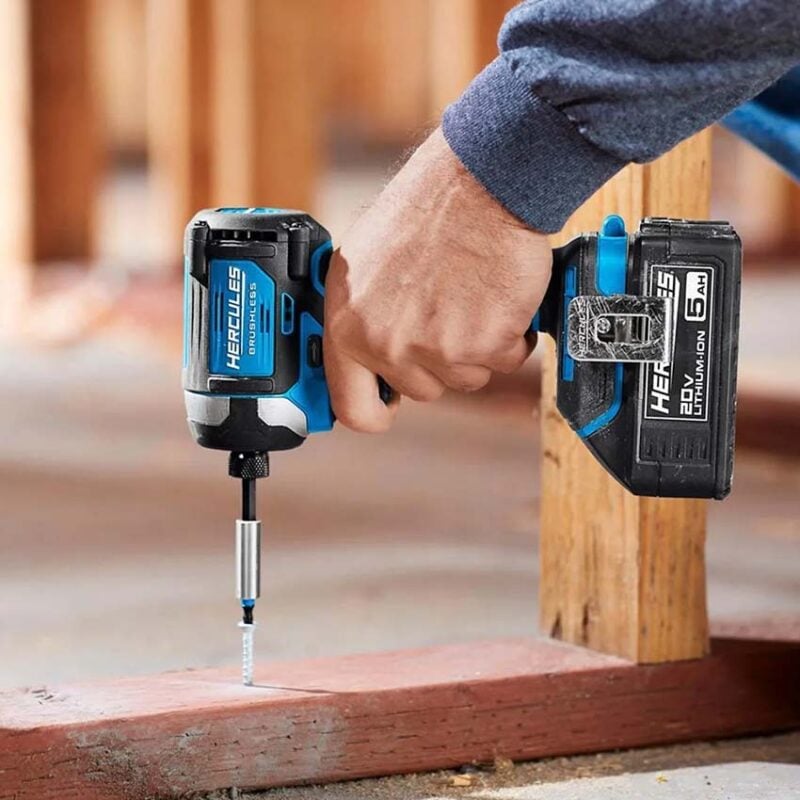
Highlighted Features
- Self-tapping Screw Mode: Reduces the risk of shearing off screw heads
- One-hand Bit Insertion: Insert a bit without having to pull out the collet
- Tri-beam LEDs: LEDs surround the collet and greatly reduce shadows
| Test | Result |
|---|---|
| RSS Screw | 7.78 sec (6th place) |
| Lag Screw | 2.75 in (6th place) |
| Bolt Break | 1.96 sec (4th place) |
Pros
- Surprisingly competitive performance for the price
- Lightweight
- Compact head length
- Low price
Cons
- Still trying to prove if it has long-term durability
Hercules provided the biggest surprise in our testing by outperforming several major brands and notching impressive results considering how low its price is. Better still, it’s packed into a lightweight and compact design.
For DIYers who like deal hunting, the sub-$100 price tag for the kit is compelling. If you need an impact driver for occasional use, Hercules offers a lot of bang for your buck with this model.
This is a brand still trying to prove its long-term reliability, though. We’ve run into issues with Hercules previously in our testing, so I’m not as confident it will hold up for Prosumers and value-minded Pros. However, this model hasn’t shown any signs of problems yet, and with that 5-year warranty, it might be worth a shot.
Bosch 18V Brushless GDR18V-215

Score: 78 Points
- Top Speed: 3300 RPM
- Max Torque: 1900 in-lbs
- Impact Rate: 3800 IPM
- Length: 4.94 in
- Bare Weight: 2.3 lbs
- Tested Weight: 3.4 lbs
- Price: $149 bare, $169 kit
- 2-Tool Combo Price: Not available
Highlighted Features
- Self-tapping Screw Mode: Reduces the risk of shearing off screw heads
- Wood Screw Mode: Reduces the risk of damaging material by overdriving
- One-hand Bit Insertion: Insert a bit without having to pull out the collet
- Tri-beam LEDs: LEDs surround the collet and greatly reduce shadows
| Test | Result |
|---|---|
| RSS Screw | 9.76 sec (8th place) |
| Lag Screw | 3.25 in (8th place) |
| Bolt Break | 2.73 sec (7th place) |
Pros
- Lightweight
- Compact head length
- Excellent value
Cons
- Only two standard speed modes
- No combo kit option
- Performance lags behind with larger fasteners
Bosch’s GDR18V-215 isn’t the highest-performing model on the 18V line. That accolade belongs to the GDR18V-1950. We didn’t have that model on hand for testing, but we did have 215. Considering its attention-grabbing price point, we decided to see how it would fare against the rest of the field.
There was a noticeable difference compared to the top performers of the group, but its mid-range results will make some Pros question whether it’s worth the additional cost to move up to the top of the line.
In some cases, the answer will be yes to higher performance. But for those of you who primarily work with small to medium-sized fasteners, the value and quality packed into this model are hard to ignore.
Makita 40V max XGT GDT01
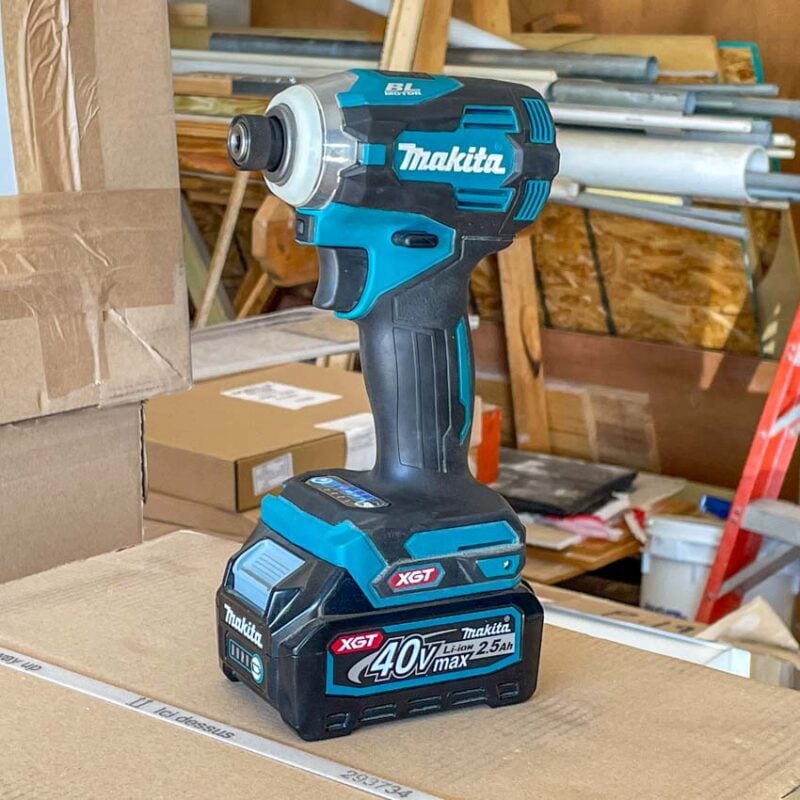
Score: 75 Points
- Top Speed: 3700 RPM
- Max Torque: 1950 in-lbs
- Impact Rate: 4400 IPM
- Length: 4.6 in
- Bare Weight: 2.2 lbs
- Tested Weight: 4.2 lbs
- Price: $224 bare, $449 kit
- 2-Tool Combo Price: $469
Highlighted Features
- Four Speeds: Offers greater control than other impact drivers
- Two Self-tapping Screw Modes: Reduces the risk of shearing off screw heads
- Assist Mode: Starts slow to reduce the risk of camout
- Three Forward and Reverse Auto-stop Modes: Automatically stop fastening or loosening at specific tension levels
- Mode Selection Button Above Trigger: Quickly cycle through the four standard speed modes
- Dual LED Lights: Set to the left and right of the collet to reduce shadows
| Test | Result |
|---|---|
| RSS Screw | 13.11 sec (11th place) |
| Lag Screw | 3.13 in (7th place) |
| Bolt Break | 2.80 sec (8th place) |
Pros
- Tons of control options
- More advanced tech under the hood than other brands
- Compact head length
- Comfortable ergonomic design
Cons
- Expensive
- Performance lags behind with larger fasteners
At first glance, Makita’s score in this review is lower than we expected. A closer analysis at the data reveals why, though. In the 10+ years I’ve been at Pro Tool Reviews, I can’t think of a single time Makita chased high torque values on their impact drivers. It’s always been about a refined build and a smarter design.
That mindset hasn’t changed. While the performance results were a result of the tool’s lower torque, it’s not an indication of its quality. The smooth operation we expect from Makita is there along with an impressively high-tech design under the hood that’s characteristic of the 40V max XGT system. Add in a much deeper level of control through various modes, and the GDT01 feels like the difference between Red Wing and Brahma work boots (IYKYK).
Appreciating this model involves keeping it in its wheelhouse. Stick with light to medium-sized fasteners and flip over to one of Makita’s impact wrenches for larger ones, and you’ll love the design.
Makita fans may note that the GDT02 was released in 2023. However, the GDT01 is still the higher-performing model for the 40V line.
Metabo HPT 36V WH36DCM
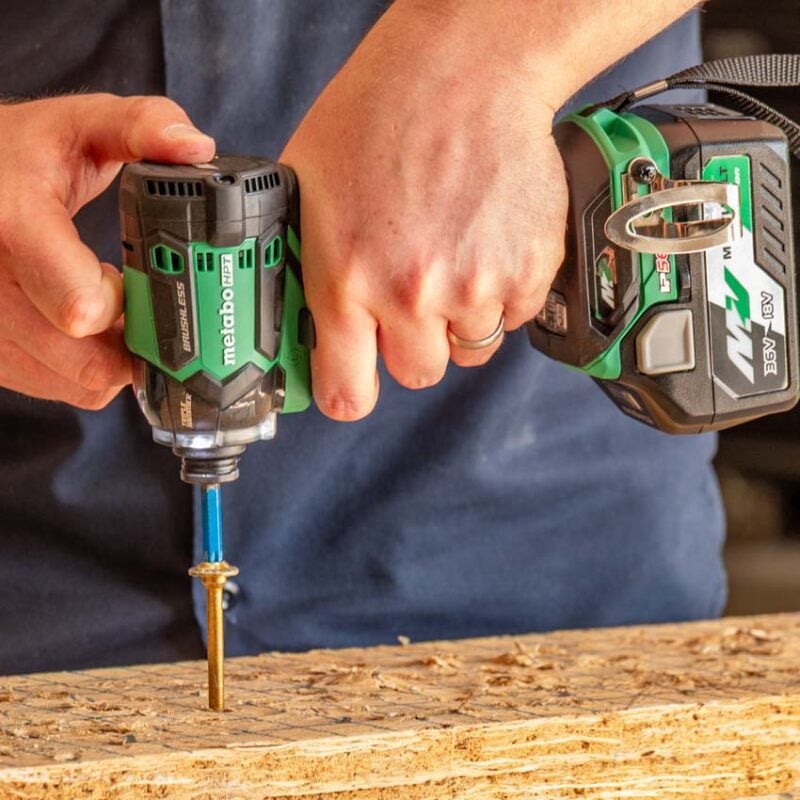
Score: 75 Points
- Top Speed: 3400 RPM
- Max Torque: 1903 in-lbs
- Impact Rate: 4100 IPM
- Length: 4.5 in
- Bare Weight: 2.0 lbs
- Tested Weight: 3.5 lbs
- Price: $329 kit
- 2-Tool Combo Price: Not Available
Highlighted Features
- Triple Hammer Design: Provides three anvil strikes on every rotation instead of the standard two of traditional designs
- Self-tapping Screw Mode: Reduces the risk of shearing off screw heads
- Bolt Mode: Specific mode for tightening or loosening larger bolts
- Bolts Single Mode: Avoids overtightening by shutting off after a short duration of impacts
- IP56 Ingress Rating: Offers better protection against the elements than most models
- AC Adapter Compatibility: Switch to AC power for unlimited runtime
- Lifetime Warranty: When you register your purchase
| Test | Result |
|---|---|
| RSS Screw | 9.54 sec (7th place) |
| Lag Screw | 4.38 in (12th place) |
| Bolt Break | 3.42 sec (10th place) |
Pros
- Compact head design
- Lightweight
- Compelling feature set
- Comfortable ergonomic design
- Lifetime Warranty
Cons
- No bare tool or combo kit options
- Only two standard modes
- Performance lags behind with larger fasteners
Like Makita, Metabo HPT’s 36V impact driver isn’t chasing super-high torque values to keep up with the performance leaders. The result is a lightweight, compact model that has a compelling feature set and excellent ergonomics.
It starts with three assist modes, including two specifically designed for working with nuts and bolts. The design earns an IP56 rating, offering better dust and water protection than other models. It’s also the only impact driver in this group that can operate using an AC adapter. While that might not be a big deal for most Pros, there are some applications where unlimited runtime trumps cordless convenience.
Finally, don’t miss the value of Metabo HPT’s lifetime warranty. If you expect a long relationship with your tools, you won’t find a better commitment than that.
Hilti 22V Nuron SID 6-22
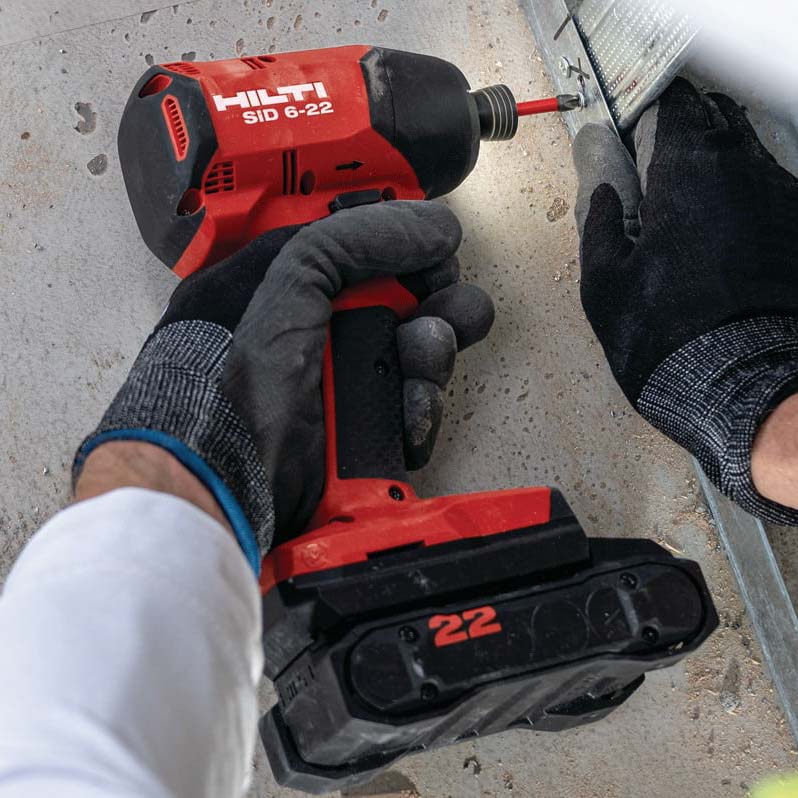
Score: 72 Points
- Top Speed: 3600 RPM
- Max Torque: 2665 in-lbs
- Impact Rate: 4250 IPM
- Length: 5.4 in
- Bare Weight: 2.1 lbs
- Tested Weight: 5.1 lbs
- Price: Starting at $239
- 2-Tool Combo Price: Not available
Highlighted Features
- One-hand Bit Insertion: Insert a bit without having to pull out the collet
- LED Ring: Diffused LED ring surrounds the collet and greatly reduces shadows
- 20-year Warranty: Much longer coverage than most brands
| Test | Result |
|---|---|
| RSS Screw | 10.37 sec (9th place) |
| Lag Screw | 3.63 in (10th place) |
| Bolt Break | 2.95 sec (9th place) |
Pros
- Industrial-grade build
- 20-year warranty
Cons
- Least compact in this group
- Expensive
Hilti had the highest torque of the group on paper, but that didn’t translate into top-tier success in our tests. Aside from a diffused LED light ring that is a legitimate upgrade from foot-mounted options, there aren’t many features to talk about, either.
What Hilti brings to the table is an industrial-quality build that commercial construction crews can rely on. That level of build ends up being a little larger, and the batteries add more weight than some brands. That’s fine, considering crews that use Hilti impact drivers are more likely to be installing steel studs on the 8th floor than repairing the hole your boat engine punched through the garage drywall.
Remember that Hilti has a 20-2-1 warranty program: 20 years of warranty coverage, 2 years of free service, and 1-day turnaround on service and repairs.
Skil PWRCore 20 ID6739B-10
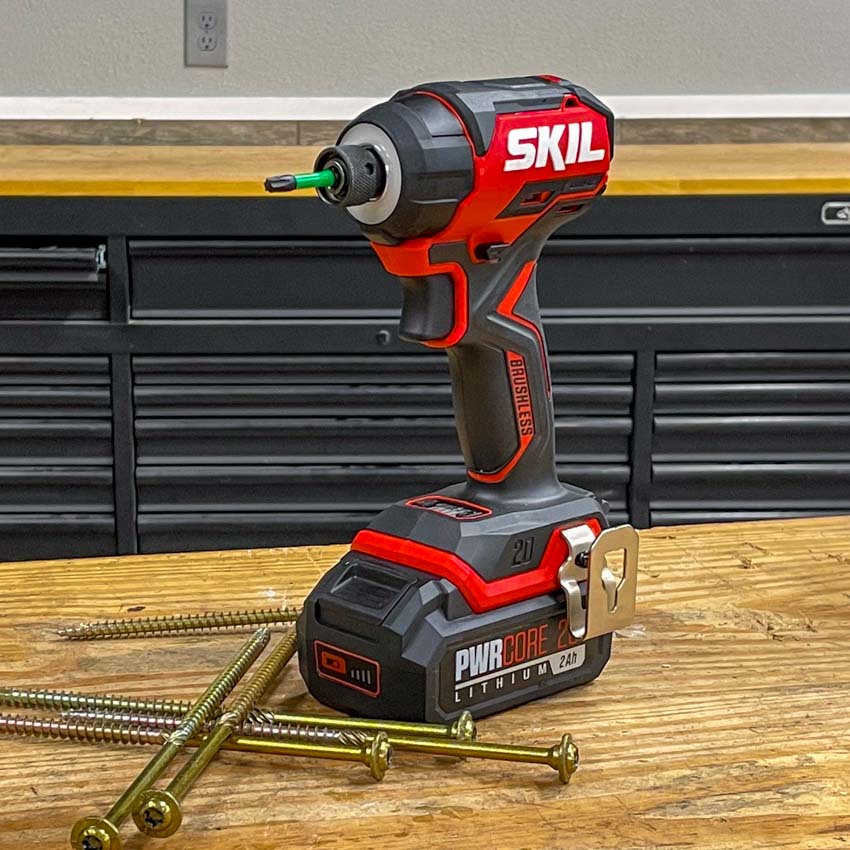
Score: 62 Points
- Top Speed: 3100 RPM
- Max Torque: 1800 in-lbs
- Impact Rate: 3950 IPM
- Length: 4.9 in
- Bare Weight: 2.0 lbs
- Tested Weight: 3.6 lbs
- Price: $69 bare, $99 kit
- 2-Tool Combo Price: $169
Highlighted Features
- Control Mode: Starts slow to reduce the risk of camout
- One-hand Bit Insertion: Insert a bit without having to pull out the collet
- LED Halo: Diffused LED ring surrounds the collet and greatly reduces shadows
- LED Light Controls: Adjust the duration of the lights
- Battery USB Output: Use your battery as a USB power supply
| Test | Result |
|---|---|
| RSS Screw | 15.55 (12th place) |
| Lag Screw | 4.00 in (11th place) |
| Bolt Break | 5.22 sec (11th place) |
Pros
- Lightweight
- Compact head length
- Excellent value
- DIY-friendly feature set
Cons
- Lower performance than the rest of the group
Skil once again earns a high value rating with its brushless PWRCore 20 impact driver kit coming in just under $100. While its performance specs and test results are lower than the Pro brands, it’s highly capable of driving small to medium-sized fasteners on a wide range of projects. It’s just not going to finish them as fast.
This is a well-built impact driver, and Skil has the confidence to back it with a 5-year warranty—much longer than most DIY brands. At the same time, this model is much more compact and lighter than previous models. Wrapping in one-hand bit insertion and an LED halo to light up your work area makes it convenient to use as well.
All this comes with a very approachable price tag. The bare tool is just $69, the kit is $99, or you can get a combo that comes with a compact brushless drill for $169. It’s a similar story for the entire PWRCore 20 system, so if you’re looking to get into a platform with solid performance that won’t break the bank, put Skil on your shortlist.
Craftsman V20 Brushless RP CMCF830
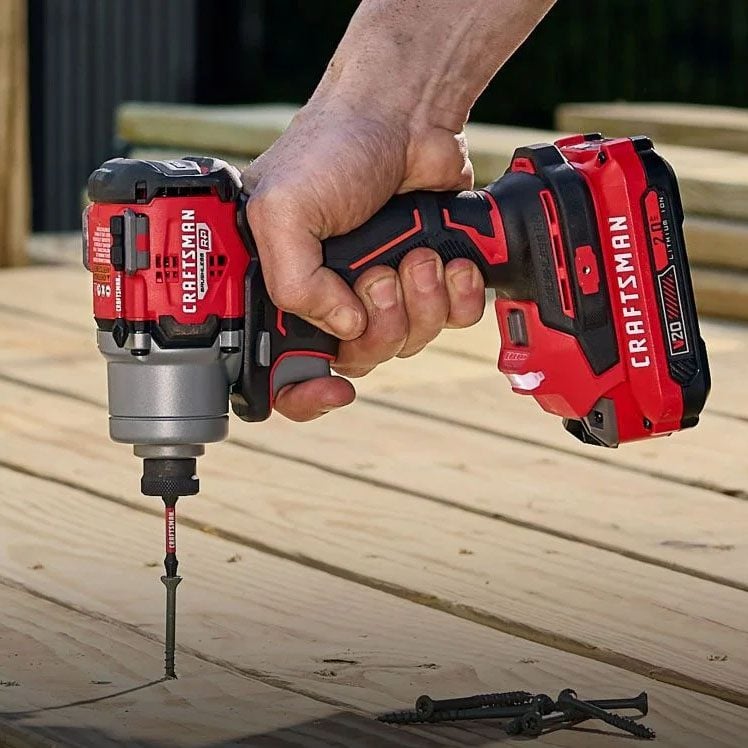
Score: 61 Points
- Top Speed: 3200 RPM
- Max Torque: 1800 in-lbs
- Impact Rate: 4200 IPM
- Length: 5.2 in
- Bare Weight: 2.1 lbs
- Tested Weight: 3.5 lbs
- Price: $119 bare, $159 kit
- 2-Tool Combo Price: $190
Highlighted Features
- One-hand Bit Insertion: Insert a bit without having to pull out the collet
| Test | Result |
|---|---|
| RSS Screw | 10.71 sec (10th place) |
| Lag Screw | 3.56 in (9th place) |
| Bolt Break | 7.04 sec (12th place) |
Pros
- Lightweight
- Boosted performance over the previous model
Cons
- Lower performance than the rest of the group
Craftsman’s newest V20 Brushless RP impact driver lifts its performance into stronger contention for DIYers. With upgrades in both speed and torque, it drives with noticeably more confidence than the CMCF820.
Against the rest of our test group, its results stayed in the lower tier. However, if you’re looking for a lightweight option and don’t mind trading off some performance, it’s a capable tool that can get the job done.
Price is still a sticking point, though. When you look at competing options from Ryobi and Skil, the value proposition isn’t quite as high.
More Impact Driver Reviews
Bosch 18V GDR18V-1950
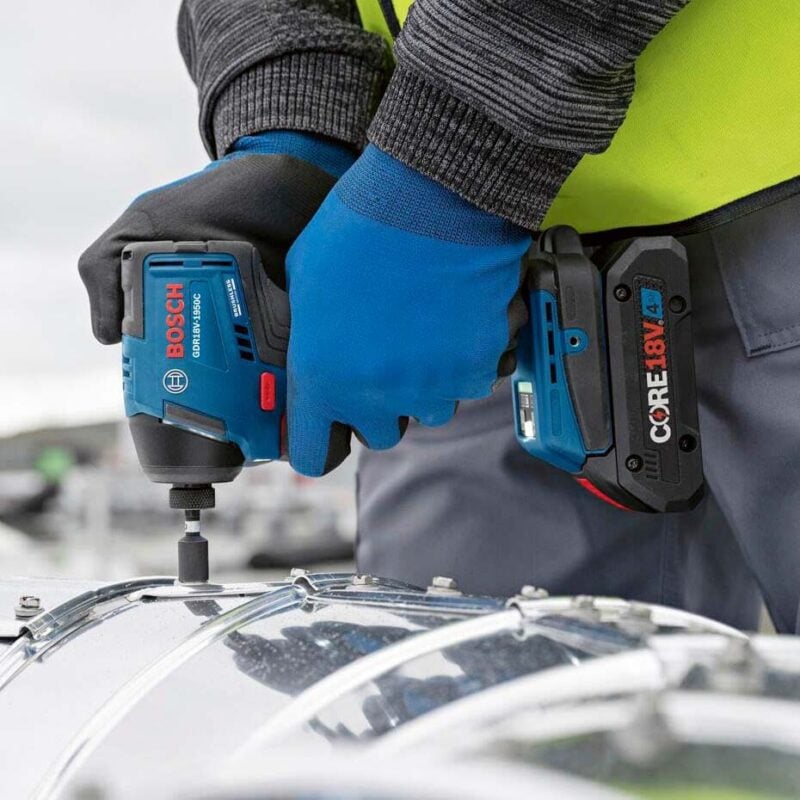
- Top Speed: 3400 RPM
- Max Torque: 1950 in-lbs
- Impact Rate: 4000 IPM
- Length: 4.5 in
- Bere Weight: 3.0 lbs
- Price: $179 bare
- 2-Tool Combo Price: Not available
Bosch’s highest-performing impact driver doesn’t set the world on fire with tons of bells and whistles, but there’s not much to complain about either. Torque has been noticeably behind its competition previously, but this model is much more in line with what we like to see.
It’s a compact design that maintains Bosch’s solid ergonomics. A couple of assist modes help you maintain better control while you’re fastening, and one-hand bit changes make things a little more convenient.
The only slight twinge of disappointment I have is that there’s no hybrid drive model (yet). Bosch’s 2-in-1 square and 1/4-inch hex design is brilliant, and this impact driver has the power to be more effective as a compact impact wrench than previous versions.
DeWalt 20V Max Quiet Hydraulic DCF870
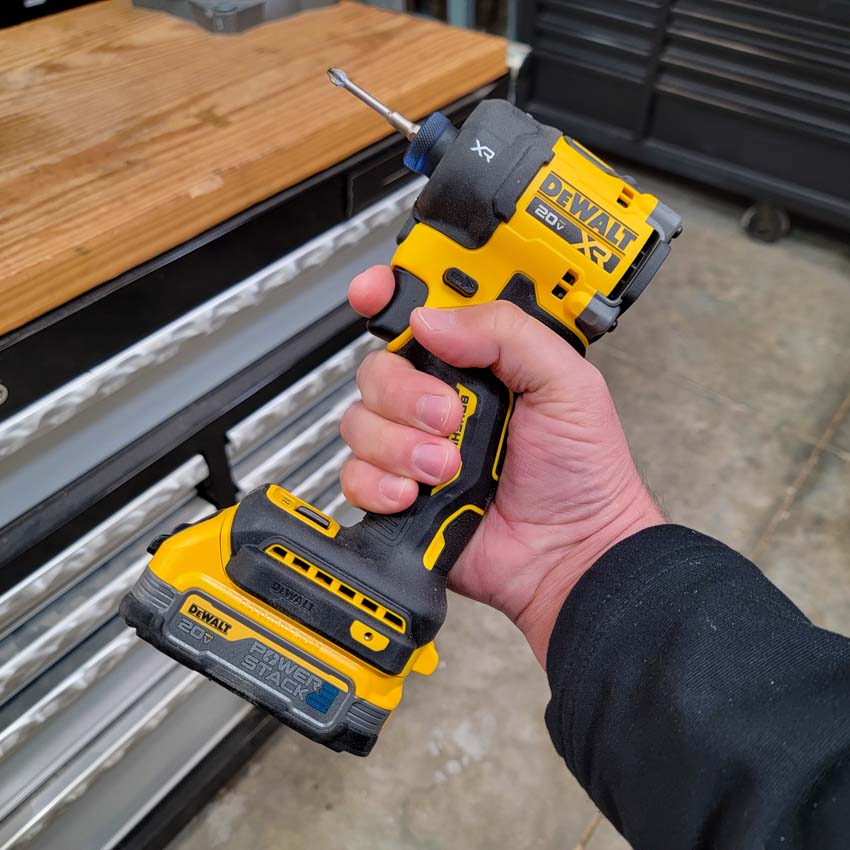
- Top Speed: 3000 RPM
- Max Torque: 500 in-lbs
- Impact Rate: 4200 IPM
- Length: 4.0 in
- Bare Weight: 2.2 lbs
- Price: $219 bare, $319 kit
- 2-Tool Combo Price: Not available
Milwaukee’s Surge hasn’t had much competition as the best quiet impact driver. DeWalt finally topped it with its DCF870 hydraulic impact driver.
In performance, DeWalt pushes the torque higher to 500 in-lbs and bumps the impact rate up to 4200 while matching the M18 Fuel’s 3000 RPM. While that’s not straight-up domination, it does raise the bar.
Where DeWalt seals the deal is with the design. Leaning on the concept of the super-compact DCF850, the head is just 4 inches long. That’s significantly more compact than any other quiet impact we’ve tested. Plus, it’s lighter than most of its competition as well.
The tradeoff is that you don’t get the kind of performance you do from standard impact drivers, but that’s the case no matter which hydraulic model you choose. The bigger consideration is that this is an expensive impact driver, coming in $50 more than the M18 Fuel as a bare tool.
Greenworks 24V Brushless IGS402

- Top Speed: 2600 RPM
- Max Torque: 1950 in-lbs
- Impact Rate: 3800 IPM
- Length: 5.0 in
- Bare Weight: 2.0 lbs
- Price: $89.99 bare, $119.99 kit
- 2-Tool Combo Price: $149.99
Greenworks has a couple of excellent DIY-focused impact drivers, and my favorite between the two is the more compact IGS402. Sporting an impressive 1950 in-lbs of torque, it has the power to handle most of your fastening projects, though the speed is a little lower than competing models. The overall weight is low and the design is reasonably compact for this class.
The downside is that this is a single-speed model. However, the price is so affordable that its value overcomes that obstacle. If three speeds is a must for you, step up to Greenworks’ more powerful ISD401 model.
Milwaukee M12 Fuel 3453
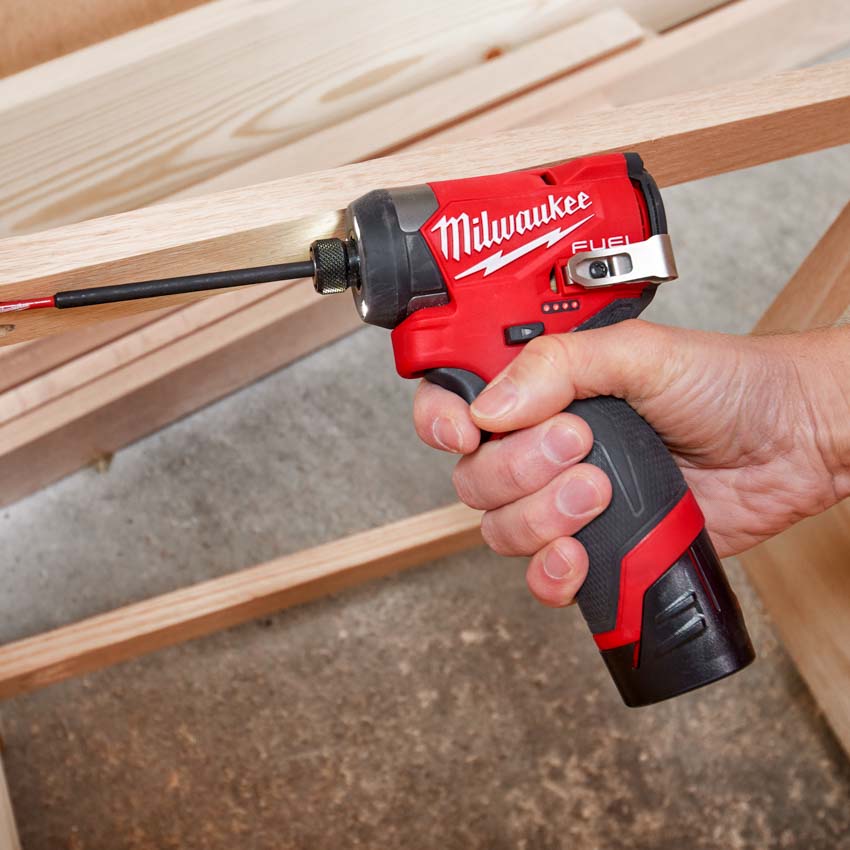
- Top Speed: 3600 RPM
- Max Torque: 1500 in-lbs
- Impact Rate: 4000 IPM
- Length: 5.0 in
- Bare Weight: 2.0 lbs
- Price: $139 bare, $169 kit
- 2-Tool Combo Price: $229
Milwaukee’s third-generation M12 Fuel impact driver made significant improvements in performance and size, making it the best 12V impact driver for performance-driven people like us.
In performance, it drives more like a compact 18V/20V max impact driver than a 12V model. Yet its size and weight are undoubtedly compact.
Milwaukee’s design is solid, with a self-tapping screw mode to go on top of its three standard modes, one-hand bit insertion, and three-LED light ring surrounding the collet.
Even if this was a close race (and it’s not), Milwaukee’s deep, trade-focused M12 battery system sets the 3453 apart from other brands you might be considering. And if that’s not enough, keep in mind Milwaukee backs this model with a 5-year warranty.
Milwaukee M18 Fuel Surge 2760
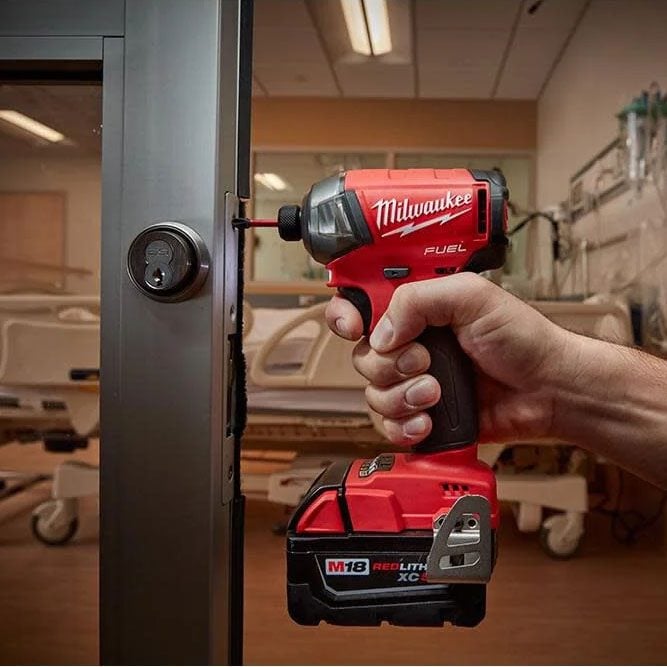
- Top Speed: 3000 RPM
- Max Torque: 450 in-lbs
- Impact Rate: 4000 IPM
- Length: 5.0 in
- Weight: 2.8 lbs bare
- Price: $169 bare, $329 kit
- 2-Tool Combo Price: $429
It’s hard to believe Milwaukee’s M18 Fuel Surge has been out for more than five years. Perhaps more impressive is that it’s been the leader in the class all that time and was just recently eclipsed by DeWalt’s DCF870.
Sporting the profile of a standard impact driver, its quieter operation makes it a go-to for screwdriving jobs in occupied spaces or when you just don’t feel like dealing with the extra noise. While DeWalt does have the advantage in size and weight, its torque is only marginally higher, and the speed is the same, keeping Milwaukee’s performance near the top of the charts for this class.
If the M12 battery system is more your style, the M12 Fuel Surge has very similar performance in a smaller, lighter package.
Impact Driver Bit Set Recommendation
Milwaukee Shockwave Impact-Rated Bits
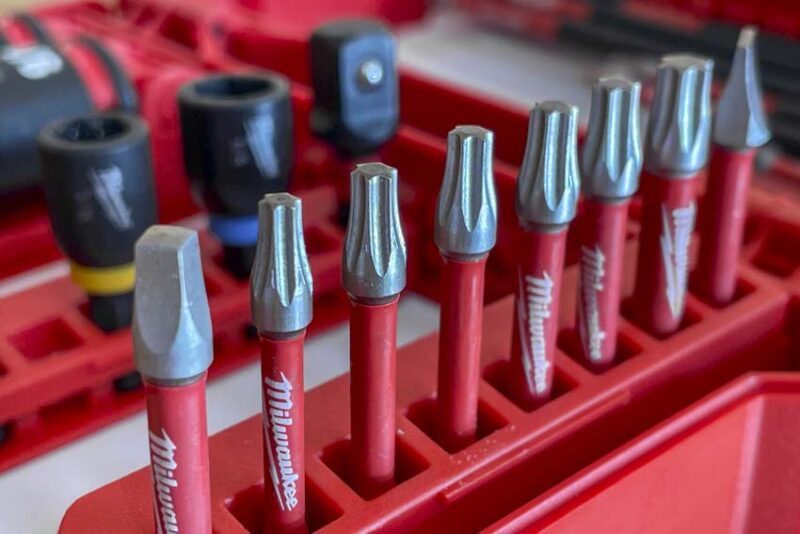
Bits designed for use in impact drivers have to flex to absorb the torsion of the impacts, or they risk breaking, especially when fastening metal. Every manufacturer has a delicate dance to perform between bit hardness, flex, and the variety of materials people like us use them on.
We’ve had good success using Milwaukee’s Shockwave line of impact-rated bits. The range is impressively wide with standard driver bits, nut drivers, specialty bits, and even drill bits with a hex shank to fit in your impact driver. There are also plenty of combo kits to save you some money over buying bits in individual or smaller packs.
Check them out for yourself and see if they outperform the bits you normally use.
Impact Driver Test Group Comparison
Battery Selection
In this test, we wanted to see how our impact drivers performed with the best batteries available. However, these compact tools can get way out of balance if you go with the highest possible capacity, so we had to find the most reasonable packs to use. Since we tested for maximum performance potential, we tested with batteries other than the ones that normally come in the kits. Here are the batteries we selected:
| Impact Driver | Tested Battery |
|---|---|
| Bosch GDR18V-215 | 8.0Ah Core18V |
| Craftsman CMCF830 | 5.0Ah V20 |
| DeWalt DCF860 | 8.0Ah PowerPack |
| Flex FX1371A | 6.0Ah Stacked Lithium |
| Hercules HCB81B | 4.0Ah Extreme Performance |
| Hilti SID6-22 | 7.9Ah Nuron |
| Makita GDT01 | 4.0Ah High Power |
| Metabo HPT WH36DC | 2.5Ah MultiVolt |
| Milwaukee 2953 | 8.0Ah Forge |
| Ridgid R862312 | 8.0Ah Max Output EXP |
| Ryobi PBLID04 | 4.0Ah High Performance Edge |
| Skil ID6739B | 5.0Ah PWRCore 20 |
Weight
Weight is straightforward but important. The lower the weight, the less fatiguing it is to use the impact driver, especially when you’re working at shoulder height or above. The batteries we chose put these at the upper limit of reasonable weight. For light to moderate screwdriving, you can use a standard compact battery to keep the weight lower or go with the smallest advanced battery available to balance weight and performance.
Here are the weights we measured for both the bare tools and with the batteries we tested:
| Impact Driver | Bare Weight | Weight w/Tested Battery |
|---|---|---|
| Bosch GDR18V-215 | 2.3 lbs | 3.4 lbs |
| Craftsman CMCF830 | 2.1 lbs | 3.5 lbs |
| DeWalt DCF860 | 2.5 lbs | 4.6 lbs |
| Flex FX1371A | 2.7 lbs | 5.0 lbs |
| Hercules HCB81B | 2.3 lbs | 3.8 lbs |
| Hilti SID6-22 | 2.1 lbs | 5.1 lbs |
| Makita GDT01 | 2.2 lbs | 4.2 lbs |
| Metabo HPT WH36DC | 1.9 lbs | 3.5 lbs |
| Milwaukee 2953 | 2.2 lbs | 4.6 lbs |
| Ridgid R862312 | 2.3 lbs | 4.5 lbs |
| Ryobi PBLID04 | 2.3 lbs | 3.8 lbs |
| Skil ID6739B | 2.0 lbs | 3.6 lbs |
Length
Regardless of the weight, a more compact impact driver gives you the advantage of working in tighter spaces more easily. In general, the more compact the design, the lighter the weight, giving smaller impact drivers a double bonus.
Here’s the head length of all the models we tested:
| Impact Driver | Bare Weight |
|---|---|
| Bosch GDR18V-215 | 4.9 in |
| Craftsman CMCF830 | 5.2 in |
| DeWalt DCF860 | 4.8 in |
| Flex FX1371A | 4.6 in |
| Hercules HCB81B | 4.8 in |
| Hilti SID6-22 | 5.4 in |
| Makita GDT01 | 4.6 in |
| Metabo HPT WH36DC | 4.5 in |
| Milwaukee 2953 | 4.4 in |
| Ridgid R862312 | 5.0 in |
| Ryobi PBLID04 | 5.2 in |
| Skil ID6739B | 4.9 in |
Speed and Torque
When you’re comparing impact drivers, many people automatically look at the torque. Don’t overlook the speed and impact rate, though. When you’re driving or loosening fasteners, hitting both hard and fast will give you faster driving speeds than a model with a similar torque level and a slower impact rate.
| Impact Driver | Max Speed | Max Impact Rate | Max Torque |
|---|---|---|---|
| Bosch GDR18V-215 | 3300 RPM | 3800 IPM | 1900 in-lbs |
| Craftsman CMCF830 | 3200 RPM | 4200 IPM | 1800 in-lbs |
| DeWalt DCF860 | 3800 RPM | 4500 IPM | 2500 in-lbs |
| Flex FX1371A | 4000 RPM | 4450 IPM | 2500 in-lbs |
| Hercules HCB81B | 3600 RPM | 4400 IPM | 2200 in-lbs |
| Hilti SID6-22 | 3600 RPM | 4250 IPM | 2665 in-lbs |
| Makita GDT01 | 3700 RPM | 4400 IPM | 1950 in-lbs |
| Metabo HPT WH36DC | 3400 RPM | 4100 IPM | 1903 in-lbs |
| Milwaukee 2953 | 3900 RPM | 4400 IPM | 2000 in-lbs |
| Ridgid R862312 | 3400 RPM | 3400 IPM | 2400 in-lbs |
| Ryobi PBLID04 | 3400 RPM | 4200 IPM | 2300 in-lbs |
| Skil ID6739B | 3100 RPM | 3950 IPM | 1800 in-lbs |
How We Tested
RSS Screw Driving
The first fastening test is the easiest in terms of how much torque is required. We drive three 3/8-inch x 8-inch GRK Fasteners Rugged Structural Screw (RSS) flush into stacked and glued OSB subfloor with a 2-inch pilot hole to get a straight start. We take the average of the three runs as the result.
This isn’t as easy as driving deck screws, so it’s not automatic that the highest speed or impact rate wins. This medium-duty task favors a balance of speed and power.
| Impact Driver | RSS Driving Average |
|---|---|
| Bosch GDR18V-215 | 9.76 sec |
| Craftsman CMCF830 | 10.71 sec |
| DeWalt DCF860 | 7.54 sec |
| Flex FX1371A | 5.86 sec |
| Hercules HCB81B | 7.78 sec |
| Hilti SID6-22 | 10.37 sec |
| Makita GDT01 | 13.11 sec |
| Metabo HPT WH36DC | 9.54 sec |
| Milwaukee 2953 | 5.96 sec |
| Ridgid R862312 | 6.83 sec |
| Ryobi PBLID04 | 6.80 sec |
| Skil ID6739B | 15.55 sec |
Lag Screw Driving
In our second fastening test, we see how far each tool can drive a 1/2-inch x 10-inch lag screw into stacked and glued OSB. Like the RSS screw test, we start with a 2-inch pilot hole. We run each tool for a maximum of 30 seconds and measure how much of the bolt is left standing proud, if any.
This test is hard for impact drivers. In our 2025 Best Cordless Impact Wrench competition, only the DeWalt DCF891 was able to drive the screw flush in the time limit. We don’t expect any impact driver to complete this test, but it does an excellent job of showing the difference in applied power and speed at the highest level.
| Impact Driver | Remaining Length |
|---|---|
| Bosch GDR18V-215 | 3.25 in |
| Craftsman CMCF830 | 3.56 in |
| DeWalt DCF860 | 2.50 in |
| Flex FX1371A | 0.63 in |
| Hercules HCB81B | 2.75 in |
| Hilti SID6-22 | 3.63 in |
| Makita GDT01 | 3.13 in |
| Metabo HPT WH36DC | 4.38 in |
| Milwaukee 2953 | 1.06 in |
| Ridgid R862312 | 1.50 in |
| Ryobi PBLID04 | 1.13 in |
| Skil ID6739B | 4.00 in |
Bolt Breaking
The final performance test is a straight-forward bolt-breaking application. Using a digital torque wrench, we set eight 1 1/4-inch lug nuts against their corresponding 1 1/8-inch semi truck studs to 150 ft-lbs (1800 in-lbs) of torque on our rig. We then use each impact driver to break all eight nuts, and report the average amount of time it takes.
Even though these are the same large lugs we test impact wrenches with, we set the torque much lower. At 1800 in-lbs, it’s within the rated torque specs of every model we tested.
| Impact Driver | Bolt Break Average |
|---|---|
| Bosch GDR18V-215 | 2.73 sec |
| Craftsman CMCF830 | 7.04 sec |
| DeWalt DCF860 | 2.56 sec |
| Flex FX1371A | 1.75 sec |
| Hercules HCB81B | 1.96 sec |
| Hilti SID6-22 | 2.95 sec |
| Makita GDT01 | 2.80 sec |
| Metabo HPT WH36DC | 3.42 sec |
| Milwaukee 2953 | 1.54 sec |
| Ridgid R862312 | 1.93 sec |
| Ryobi PBLID04 | 2.30 sec |
| Skil ID6739B | 5.23 sec |
What to Look for When Buying an Impact Driver
Performance
Impact drivers benefit from higher speeds and greater torque than their drill counterparts. Their speed helps drive small fasteners more quickly while the power and impacts tighten or break loose fasteners better than drills.
However, it is possible to have too much power. When you’re installing self-tapping screws into metal, for example, the high torque of an impact driver can easily shear off screw heads or break bit tips. That’s why it’s best to have a model with multiple modes. Better yet, assist modes like a self-tapping screw mode can let you use the full speed and torque available while reducing the risk of damage.
Size and Weight
One of the reasons we love impact drivers is that they tend to be smaller and lighter than drill drivers. They can reach into tighter areas and are less fatiguing when you’re working overhead.
With today’s technology, having a model that’s less than 5 inches across the head and under 2.5 pounds as a bare tool is easily achievable—and almost a requirement for Pro-grade models.
Grip
While we don’t come across many tools that have a terrible grip, some are better than others. Slide packs are important because they give design teams more freedom in handle and grip design. Stick packs have to fit into the handle and tend to be thicker than slide pack designs.
However, even the ergonomic design of tools with stick packs is improving. The big thing is to pick up a few different brands in the store and see which handle is most comfortable for you. Even if the exact impact driver you want isn’t on display, most every brand uses the same handle shape and overmold across all their pistol grip tools.
Feature Set
Sales 101 will teach you that every feature must have a benefit. As you consider the feature set to help determine the best impact driver, look for features that have tangible benefits. Here’s a typical list of what we look for:
- Brushless Motor: Significantly improves performance, runtime, and service life.
- Standard Speed Modes: Ideally, you want at least three standard speed modes to manage light, medium, and heavy fastening jobs.
- Special/Assist Modes: Modes specifically designed to help reduce the risk of damage, loosing fasteners, or other benefits
- Smart Features: These can include inventory management, tracking, and even custom control settings.
- LED Lights: LED lights that surround the collet do a better job of eliminating shadows and some models even offer control settings for them.
- Bit Ejection: Having a spring-loaded bit ejection can make swapping bits easier.
- Bit Insertion: Some collets accept bits without having to pull up on the mechanism, making it a one-handed operation.
Price and Value
The value a tool offers will be different for everyone, depending on what features, performance, and price you prioritize the most. Regardless, it’s the sum of what you get compared to the price you pay that determines the value for you.
Why You Can Trust Pro Tool Reviews
Ever check out a “review” site and can’t tell if they actually test tools or if they just “recommend” the Amazon top sellers? That’s not us. We won’t recommend anything unless we’d use it ourselves, and we don’t care who the primary retailer is. It’s all about giving you a legitimate recommendation and our honest opinion of each product.
We’ve been in business since 2008, providing tool reviews and reporting on industry news in the construction, automotive, and lawn care industries. Our Pro reviewers work in the trades and have the skills and experience to know whether tools can perform well in the field.
Each year, we bring in and review more than 250 individual products. Our team will put our hands on hundreds of additional tools at media events and trade shows throughout the year. The end result is information you can trust because of the editorial, scientific, and real-world professional experience we collectively utilize every time we pick up and test a tool.

